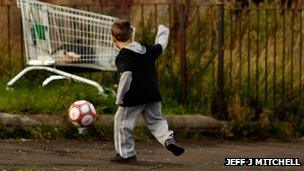Welfare cuts will lead 'more families to food banks'
- Published

The poorest children will bear the brunt of spending review cuts say charities
More poor families will depend on food banks and doorstep loans once changes and cuts announced on Wednesday take effect, warn children's charities.
Having to wait seven days before claiming jobseeker's allowance will hit the poorest hardest, say the charities.
The changes, announced in the Chancellor's Spending Review, will apply from April 2015.
This will lead to "a food banks first policy", Alison Garnham of the Child Poverty Action Group says.
Currently claimants can receive jobseeker's allowance three days after losing their jobs. But from 2015, this will be extended to a week for all claimants.
The government argues this will bring the UK more into line with other countries and improve the efficiency of job centres.
'Poverty cycle'
Announcing the change, Chancellor George Osborne said: "Those first seven days should be spent looking for work and not looking to sign on."
But Ms Garnham says the plan "will hurt families stuck in the low pay, no pay cycle, moving in and out of insecure, low-paid jobs and will lengthen food bank queues.
"We're talking about parents doing the right thing but who have very little in the way of savings to tide them over if they lose their job.
"There should be no doubt this will leave more families and children cold and hungry and push more families towards doorstep lenders and food banks."
These fears were echoed by Chris Mould of the Trussell Trust, which runs more than 300 food banks across the UK.
"Any delay in starting payments of social security to people who have just lost their jobs will increase the number of people who are referred to food banks."
Other changes include making weekly meetings with job centre staff mandatory for about half of jobseekers, in response to concerns that some were not doing enough to find a job themselves.
Fiona Weir of lone parents' charity Gingerbread said single parents would be particularly badly hit.
She said despite being "highly motivated to work", they needed tailored advice and support, more action on childcare costs and faster creation of family-friendly jobs that enable them to combine work and care.
Ms Weir added that faced with claimants attending more often, "stretched job centre advisers" would be "able to do nothing more than box-ticking" rather than provide such tailored support.
Mr Osborne told BBC Breakfast the country faced "tough decisions".
'Not easy'
"We've said all along this is very difficult and very difficult choices are going to have to be made. We've been absolutely straight with the British people that this is not easy, we are not pretending it's easy.
"But that is the economic plan that is taking Britain out of rescue into recovery, and we've absolutely got to deliver that plan because the alternative... is one of real economic crisis for our country which would give rise to a big increase in unemployment, the business failures, the high mortgage rates which would do enormous damage to families."
The warnings about the effects of the Spending Review on the poorest families come as a report from the Children's Commissioner for England suggests that tax and benefit changes already in place are "hitting the poorest children hardest".
The study by independent economists suggests the cumulative effects of cuts in public spending and tax and benefit changes have meant that families with children have been losing "on average £41.07 a week" since 2010, with single parents in particular losing 7.8% of their income.
They add that the government's universal credit will go only some way to offsetting these negative effects.
Commissioner Dr Maggie Atkinson described the report as "uncomfortable reading".
"More children are entering poverty. Ultimately, that means more children going without the basics because their parents and carers cannot afford them," she said.
A Treasury spokeswoman reiterated points made in the Chancellor's speech that the changes were designed to ensure that work always pays. She listed measures taken by the government to help families with the costs of living. These, she said, included: "Increasing the tax-free personal allowance to £10,000, which will save a typical taxpayer over £700; freezing council tax for five years, saving a typical household £600; and freezing fuel duty which has helped to keep fuel prices 13 pence per litre lower than they would otherwise have been.
"At yesterday's spending round, the Chancellor confirmed the continued protection of the schools budget and spending on the pupil premium, which provides extra funding for the most disadvantaged pupils."
- Published26 June 2013
- Published26 June 2013
- Published26 June 2013
- Published26 June 2013